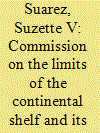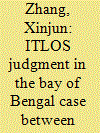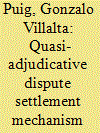| Srl | Item |
| 1 |
ID:
121892


|
|
|
|
|
| Publication |
2013.
|
| Summary/Abstract |
In addition to the function of considering and giving recommendations on the submissions of coastal States on the outer limits of the continental shelf beyond 200 nautical miles, the Commission on the Limits of the Continental Shelf (CLCS) is also tasked under article 2 of Annex III of the 1982 United Nations Convention on the Law of the Sea to provide scientific and technical advice to the coastal States in the preparation of their submissions. The legal literature focuses mainly on the function of the CLCS to consider and make recommendations on submissions. This article aims to cover the gaps in literature and addresses thorny issues relating to the nature, scope, contents and consequences of the advice, including the relationship of the coastal State, the CLCS and the individual commissioner providing advice.
|
|
|
|
|
|
|
|
|
|
|
|
|
|
|
|
| 2 |
ID:
121891


|
|
|
|
|
| Publication |
2013.
|
| Summary/Abstract |
The international law of succession has always been portrayed as being in a state of crisis. Whilst this crisis was long one of formal existence, the entering into force of the 1978 Vienna Convention international law of State succession in respect of treaties did not put an end to the-more profound-paradigmatic crisis at the heart of the international law of succession. Against this backdrop, this essay starts by recalling the two conflict objectives that were simultaneously pursued during the codification of the international law of State succession in respect of treaties (Section II). It then outlines how the codification process could hardly distance itself from the fresh reality (and the emotions) of decolonization, the latter eventually hovering over all the debates unfolding at that time (Section III). It goes on to describe the rules specifically designed to address questions of succession in connection with the decolonization process (Section IV). This essay subsequently recalls how the implosion of the USSR and Yugoslavia brought about a repudiation of the international law of State succession in respect of treaties, and especially those rules pertaining to states which emerged from the decolonization process (Section V). The final section argues that the move away from the international law of succession regarding former colonies epitomizes the illusion behind the entire law of succession according to which the birth and death of States can be formally regulated by rules estranged from the identity struggles unfolding in succession crisis (Section VI).
|
|
|
|
|
|
|
|
|
|
|
|
|
|
|
|
| 3 |
ID:
121888


|
|
|
|
|
| Publication |
2013.
|
| Summary/Abstract |
The Bay of Bengal case is the first maritime delimitation case before the International Tribunal for the Law of the Sea (ITLOS); the judgment is a milestone in the jurisprudence of the Tribunal for it to fulfil its designated role of "interpretation or application of the Convention". This article summarizes the judgment and makes comments on several issues: jurisdictional issues relating to the change of forum, interpretative issues on "innocent passage", the "equidistance/relevant circumstances" method of delimitation, and finally interpretation of Article 76 of the Convention, with special note on the roles of the Commission on the Limits of the Continental Shelf (CLCS) and the Tribunal in the process.
|
|
|
|
|
|
|
|
|
|
|
|
|
|
|
|
| 4 |
ID:
121889


|
|
|
|
|
| Publication |
2013.
|
| Summary/Abstract |
This article analyses the exclusion of the rule of law in dispute settlement from trade relations between Mainland China and Hong Kong. Other than a power-based provision to resolve any problems through consultation, the Closer Economic Partnership Arrangement (CEPA) between the Central People's Government of the People's Republic of China and the Government of the Hong Kong Special Administrative Region does not contain any rules or procedures for the settlement of disputes between the two sides. The politicization of dispute settlement favours the freedom of informality but compromises certainty of implementation, efficiency of consistency, and transparency of justice, all necessary for further and fairer trade creation and economic integration. This article, therefore, calls for the rule of law in trade relations between Mainland China and Hong Kong with a proposal for a quasi-adjudicative dispute settlement mechanism for CEPA that complements the political framework for consultation and negotiation with an adjudicative framework for arbitration and implementation.
|
|
|
|
|
|
|
|
|
|
|
|
|
|
|
|
| 5 |
ID:
121887


|
|
|
|
|
| Publication |
2013.
|
| Summary/Abstract |
During the civil wars in Libya and Syria, the rebel opposition groups were recognized by some as "the (sole) legitimate representative of the people" of these States. This paper, using the situation in Syria as a case study, examines what it means to recognize a group as "the legitimate representative of a people", while the State's government is still in place. It shows that with regard to recognition statements wording is all important, and that the Syrian Opposition Council has been recognized in at least six different capacities of varying legal significance. The paper sets out the difference between the "legal" and the "political" act of recognition and finds that recognition as "the legitimate representative of a people" is a purely political act. Although four normative criteria for the status of "legitimate representative of a people" can be identified, what is lacking are clear standards for their application. The paper outlines the consequences of political recognition and examines its legality in terms of international law and its suitability as a political tool.
|
|
|
|
|
|
|
|
|
|
|
|
|
|
|
|
| 6 |
ID:
121890


|
|
|
|
|
| Publication |
2013.
|
| Summary/Abstract |
Water is increasingly scarce in Central Asia. The nations of Uzbekistan, Turkmenistan and Kazakhstan (the "lower" nations) face significant resource issues in their relations with Tajikistan and Kyrgyzstan (the "upper" nations). The otherwise relatively resource-rich "lower" nations sit downriver from the "upper" nations, which suffer a dearth of non-water resources and spotty electrical flow. These "upper" nations have begun to think of transboundary rivers as sources of hydropower and to view their national control of water as a means to improve economically. This paper discusses the failure of past regional and sub-regional treaties to resolve these ossifying conflicts of interest, and explains that only a truly multilateral convention might allow these nations to collectively determine a way forward which satisfies all parties.
|
|
|
|
|
|
|
|
|
|
|
|
|
|
|
|